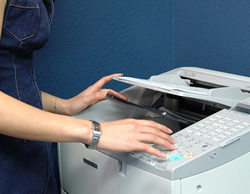 The Public Service in the Canadian Province of Ontario has been directed to phase out fax machines by the end of the year — although for the younger generation of Government workers it is baffling the bulky photocopier-type machines have lasted so long.
The Public Service in the Canadian Province of Ontario has been directed to phase out fax machines by the end of the year — although for the younger generation of Government workers it is baffling the bulky photocopier-type machines have lasted so long.
A relic of an era when the ‘web’ was still something spiders spun, the fax machine has withstood the advent of email, text and instant messaging to live on in several sectors, including health care.
However, its continued use carries extra costs and even risk, and Minister for Finance, Peter Bethlenfalvy says he’s directing the Province’s Public Service to phase out its 1,500 surviving traditional telephone fax lines.
An early version of the fax (short for facsimile) was invented in 1843, but it wasn’t until the 1980s that the devices became commonplace in Canadian offices.
In 1988, a television news report stated that: “What’s your fax number?” had become one of the most frequently asked questions in business.
The COVID-19 pandemic cast a spotlight on the health care sector’s reliance on faxes as doctors still submitted prescriptions to pharmacies that way.
In New Brunswick, a fax backlog last November resulted in people spending days in isolation waiting for COVID-19 test results.
The hold-up partly stemmed from the machine’s capacity to receive only one message at a time, at a speed of about 130 seconds per page.
Mr Bethlenfalvy said the end of the fax machine was about a mindset change through all the Ontario Public Service “about how we engage with citizens and how we embrace technology that’s private and secure”.
Asked whether the Government would be providing Public Servants with a plan to gradually phase in alternative technology, the Minister said there were “so many tools to ship information back and forth”.
He pointed to electronic forms and signatures and digital document management.
For those who still use the fax, it can have benefits; traditional paper-to-paper machines appear virtually un-hackable since they are based on analogue technology, offering a simple way to transmit confidential information directly to another device.
Toronto, 21 March 2021











